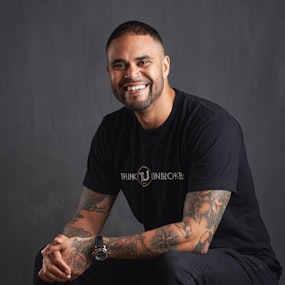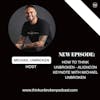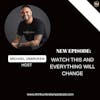Unlocking Your Dream Life: Building a Thriving Business with Jim Palmer
In today's episode we explore the concept of creating your dream life through building a dream business with Jim Palmer, the dream business coach... See show notes at: https://www.thinkunbrokenpodcast.com/unlocking-your-dream-life-building-a-thriving-business-with-jim-palmer-1/#show-notes
In today's episode we explore the concept of creating your dream life through building a dream business with Jim Palmer, the dream business coach.
In this conversation, we dive deep into the challenges of pursuing your dreams, the benefits of taking risks, and the healing power of entrepreneurship. Jim shares his inspiring story of rising from rock bottom to rebuilding his life by betting on himself and finding the tools and community he needed to create the life he wants. We discuss the nuances of shaping your life, including family, relationships, money, and more. This episode offers valuable insights for anyone seeking to pursue their dreams and build the life they desire. So, join us for this engaging conversation and discover how Jim's journey can inspire you to take the next steps towards your dream life.
************* LINKS & RESOURCES *************
Learn how to heal and overcome childhood trauma, narcissistic abuse, ptsd, cptsd, higher ACE scores, anxiety, depression, and mental health issues and illness. Learn tools that therapists, trauma coaches, mindset leaders, neuroscientists, and researchers use to help people heal and recover from mental health problems. Discover real and practical advice and guidance for how to understand and overcome childhood trauma, abuse, and narc abuse mental trauma. Heal your body and mind, stop limiting beliefs, end self-sabotage, and become the HERO of your own story.
Join our FREE COMMUNITY as a member of the Unbroken Nation: https://www.thinkunbrokenacademy.com/share/AEGok414shubQSzq?utm_source=manual
Download the first three chapters of the Award-Winning Book Think Unbroken: Understanding and Overcoming Childhood Trauma: https://book.thinkunbroken.com/
Join the Think Unbroken Trauma Transformation Course: https://coaching.thinkunbroken.com/
@Michael Unbroken: https://www.instagram.com/michaelunbroken/
Follow us on TikTok: https://www.tiktok.com/@michaelunbroken
Learn more at https://www.thinkunbrokenpodcast.com
Listen more about Jim Palmer at: https://www.getjimpalmer.com/
Learn more about your ad choices. Visit megaphone.fm/adchoices
Support the Podcast: Become a listed sponsor!
Follow me on Instagram @MichaelUnbroken
Learn more about coaching at https://coaching.thinkunbroken.com
Get your FREE copy of my #1 Best-Selling Book Think Unbroken: https://book.thinkunbroken.com/
Michael: Hey! What's up, Unbroken Nation! Hope that you're doing well wherever you are in the world today. I'm very excited to be back with you with another episode with my friend, Captain Jim Palmer. Jim, my man, what is going on in your world today?
Jim: Oh, it's a great fall day. This is actually as we doing this, it's the end of the day, so hopefully my tongue won't be too terribly tied. But just enjoying life and Michael, this is the first time in five years I'm not planning a route south because we're temporarily landlocked, we're no longer on the boat, which is where I interviewed you a little while ago.
Michael: Yeah, I was looking, I was like, where's the boat at Jim? What's going on, captain?
Jim: It's there and it's in front of me. My eyes are fixed on my beautiful boat.
Michael: Yeah. Well, welcome back to the land of the walking man, you know.
Jim: Family, friends, and taking care of elderly parents and things like that, it's just part of life.
Michael: It's life, dude. You know, it's funny, man. I think about that a lot the older that I get, I'm just like, damn, dude, life f**** life sometimes. And I sit here and I look at it, and I'm not saying that's a bad thing, right? Because I think people will go, oh man, life is so terrible, it's not that life doesn't have moments, but like in between the bad is the good and in between the good is the bad, and you kind of have to go through it and you make meaning of it. But before we dive down that rabbit hole, which I know we're going to, tell us a little bit about your backstory and how you got to where you are today?
Jim: Yeah, so the short version is I was 41 years old, VP of marketing for a training company, and I lost my job, I'd done very well for myself, so my giant ego told my wife not to worry, I'll be fielding multiple lucrative job offers in days, maybe weeks. Well, 18 months later, still unemployed, 12 months into the unemployment, I got cancer, and for about a month, I didn't know if my chance of being alive in five years was either 80% or 50% so that really wreaks havoc on how your outlook on life and regrets, things like that, or potential regrets. And I call that my season of crises, which, you know, brought me into a great relationship with the Lord in just a really healthy respect for how short life can be and how you gotta pack everything into it. I basically, was told I got on my knees and prayed with what am I supposed to do? ‘Cuz I'm like completely lost. I was told to become an entrepreneur. I said, all right, let's do it. My first year, revenue free, as I like to call it, Michael, so it took me one year to get my first client, and then, I grew my first business to about 300,000 in five years. And then I learned about internet marketing and started five different internet companies. In 2009, I started coaching what is now the Dream Business Mastermind Coaching Program, and that's my main income source today. Seven years ago, I stopped the old 80-hour work weeks and decided to work three days a week, and I structured my whole life around Tuesday, Wednesday, Thursday, which is when I work with my clients, and that's when then Stephanie and I moved on that boat for a one-year adventure that became our lifestyle over five years, we traveled about 12,000 miles. And now we're landlocked and taking care of some family matters, which is part of life as we said.
Michael: Yeah, dude, that's wild. You know, it's funny because I became an executive VP of marketing for international multimillion dollar company when I was 30. And that's outside of Think Unbroken, a company I'm still a part of and so Think Unbroken is another business obviously. And I think about the massive amount of stress that people, especially in executive leadership positions are under I mean, across my companies, we sit around 30 plus employees, right? And doing multimillion dollars in businesses. And dude, I'll have these days where today's a f**** perfect example, Jim, where it's like up at 5:30, out the door at six into the office by seven, hit the gym, do the thing, show up, do the meetings, blah, blah, blah. And then in the middle of it, I sit and I go, why am I doing this? And in that moment, what I always remind myself of is that, I'm fulfilled and I'm happy. And I think a lot of times what happens is people, and you could be working anywhere, it doesn't matter. But as long as you're fulfilled, it seems to me that I'm willing to drive and I'm willing to go forward. But so many people get caught up and then life hits them, they lose the job, they find out they get cancer and then all of a sudden they're in this place where it's like, oh man, I did all that hard work and I was feeling good about life and things were great and I was on top of the world and like you talked about the ego thing, trust me, I've had multiple ego deaths in my leadership career. And I'm wondering like, when you're faced with that moment – two things come to mind. One, there's that space and place for lack of better phrase, ego death. And then there's that space for, okay, well Jim, what are you gonna do about it?
Jim: An identity goes to death goes right with that, Michael, because you know, in my own description, I've done a lot of speaking I say I went from being an unemployed loser, my own language ‘cause I'm watching neighbors go to work and I’m like hat is going on? I'm reading papers, applying, and all these different things. I know now that, you know, God had different plans for me, which kind of put me through that whole thing. But in the process, I mean, again, I ran national franchise and I did a lot of things, so I thought, man, this is gonna be great, but this is what I was meant to do. And going through a lot of what I went through is part of what makes me a good coach today, right? It is the broken mindset, it is feeling like you have no self-worth until you figure out what are your real gifts and talents, and maybe you can make a business out of those and serve others with the experience we go through.
I did an interview just yesterday, Michael, and someone mentioned how you supposed to share it. Reminded me when I got the cancer, which was melanoma, which I had never heard of until I got the diagnosis and I shared it with all my family, including, you know, distant cousins and two of my cousins went and had something checked, turned out to be melanoma because I shared it with them. Who knows lots of reasons why we go through things but it's just interesting that so many of our experiences and what I learned is, you know, probably men and women, but I think probably a little bit more men, we are tied to our title. Right. I mean, oh my God. Hey, I am a VP, I wanted to be a VP by 40. I made it and then, then lost my job, right? But we're so driven by our identity, by who we think we are, based on title or status or things like that. And I'm here to tell you, I've been really, really broken to use your terminology and that's not who I was at all.
Michael: Yeah. When you were in that, you know, I look at, I don't wanna call that your rock bottom I'm not gonna put words in your mouth, but when I hit mine at 25, you know, I'm looking at this life, it's like, dude, you made a million bucks, you're 50 grand in debt, 350 pounds, life is this disaster. And I realize, Jim, like my health was on the line. I got super sick. I actually almost died. I got this bacterial infection. And I was like, nobody's coming, ain't nobody coming to save your ass and that was this really, really interesting moment for me because for the first time it really felt like I was taking accountability of my life. What was it like for you in that moment? Cause like, to me, look, I've never had cancer. I don't know what that's like, but I do know what it's like to be on your literal deathbed like, am I gonna make it through the night? What was happening like in your life and in your mind in that moment?
Jim: You know, I was getting pretty desperate, but I also, I mean, we have four children and when I lost my job, four kids still at home, four teenagers, so, luckily the food bill was astronomical. I got for I dunno what it would be like today in today's dollars, but I still had four teenagers at home. And I was trying to do the right thing and look, I'm finding work became my full-time job but believe me, there are moments I'm like, what have I done? I mean, was it so important me to climb and go from job to job? And for more, more, more, more, more. I had this thing, I wanted to have a boat my whole life. I wanted to have a house on a lake with a boat and all that was just something, they were things that I was chasing, right? And I know that now, nothing wrong with having things, but I look back at those darkest moments and believe me, even after I started my business, I went literally overnight from being an unemployed loser to the CEO of my own corporation ‘cuz it said so in my glossy business card that I got from Vistaprint. Right?
Michael: I wasn't making no money.
Jim: Oh my God. I had a chair and I set my office up, this is gonna be great. And two months later, I got no money coming in, you know, I'm a business owner, but I got no money. And you know, it was interesting when I was unemployed, Stephanie told me about this group at church, which was for unemployed people, it was like a support group. I said, I ain't going to that, why not? Oh, I'm gonna stand there, Hey, I'm Jim, I'm unemployed. Well, maybe you can help somebody else, maybe it's not about you. She told me that, I mean, it really hit me right in the eyes with that one. And it's true, I went there and because of my experience, I was able to help a few other guys and you know what happened? Things started turning for me a little bit. So, I dunno, it's probably a long weaving answer, but I learned about being in service to others during that whole time. You know, one of the times that was really scary to us was we were approaching Thanksgiving and Christmas with like no money and I'm starting to bankroll mortgage and things on credit cards, keeping the family afloat. And somebody knocked on our door and left like two huge bags of groceries, including a Turkey and all the fixings and stuff. And I'm like, what in the hell was that? I mean, I'm like, that is amazing. I hope I can pay it forward someday. But all these different things started happening and I dunno if that answered your question or not but it was by far the most pivotal moment in my life going through that. And by the way, the season of crisis, a lot of times after you get cancer, you know, you say you're gonna be okay. The doctors say you're gonna be okay. I mean, I go for like, checkups three, four times a year the rest of my life. But you start wondering, well, why did that happen to me? Why me? Right. And our church, the men's group at our church gave out this book once and it was called The Seven Seasons of The Man In The Mirror. And to me, I'm like, I ain't gonna read that. I'm not gonna read that. I was reading business books and Mysteries. I'm not gonna read that book. Right. Well, I picked it up one night, Michael and I flipped a table of contents, it turns out the author was actually an entrepreneur. So, I said, oh, maybe, let me see if this guy's talking about. And chapter three was called Season of Crisis. And sometimes, you know, don't mind me talking about the Lord a lot, but the Lord will bless you with a season of crises to bring you into a right relationship with him. And that made sense to me ‘cuz up to that point, I admit, I thought everything I was doing great was all on me, I'm great. And I know now that's not the case, but so that's why I went through all that. And as hard as it was, as you know, we racked up over six figures in credit card debt but all that was the turning point for me and just help me start the business and then grow from there, I mean, that's a whole another chapter about fixing mindset, you know, growing businesses and stuff. But that was honestly it's easy language when I felt very, very broken.
Michael: Yeah, man, that's really interesting to me. You know, what's laid in front of us so often is really a decision, right? This is how I think about so much of life, it's like, it doesn't matter what it is, but something, whatever it is that's in front of you, it requires a decision. And I don't think people recognize what the decision actually is and I think this applies to everything, Jim, and that decision is how am I going to interpret what is actually happening right now? You know, for so many people, especially when they have these life altering moments, they go, oh, why does everything hate me? Why does the universe hate me? Why does God hate me? Why does you know, whatever? Why is everyone against me? And I often sit and look at it and go, well, how is this benefiting me? What is here that I needed to know? How has this experience made me a better person, brother, entrepreneur, leader, friend, partner, right? I don't think that you ever learned from success. Jim, I've never been like, super successful at something and then took something of value from it. I can't recall a time where I've ever been like, oh, nailed it, Kobe and then I was like, I learned something. No, but it's in those moments of, man, I made this leadership mistake. I made business mistake. I've ruined a relationship. I ruined a friendship. I was morbidly obese and overweight like I took something from all of those things. When you were in this, because I get that place, man, especially when you're pushing and you're like, I want the lake house, I want the boat, I want this thing, some of it's prideful, right? And that's fine. I don't think there's anything wrong with that. And part of it is like, I want it because it's gonna prove to me that I'm capable of doing it. And then you're like, wait a second, here's the baseball bat to the face, are you sure you want it? And so, what I'm curious about is, so you're in this place, you're in the rebound, you're building the business, and I understand the zero revenue first couple of years of a business. I don't think people really resonate with that, but you're now in this thing where it's like, how bad do you actually want it, Jim? How do you navigate that moment?
Jim: Well, first of all, you mentioned decide, and I remember, so I interviewed you, I looked up as episode 496 at Dream Business Radio. And in there you talked about successful people have the ability to decide you went on. But I'm like, oh my God, I don't even if he knows that's, well, that was my sixth book, I brought it here. DECIDE. It's the ability to make decisions and move forward to say yes or no, but not maybe, maybe's a place where you go, I call it squishy bill cause that's where opportunity goes to die So, making a decision, right? Squishy. So, you know what's interesting is that when people move forward, you have choices that's a lot about coaching today. And sometimes coach people will come for branding and marketing, but it's so much of the mindset like how badly do you want it? I'll give you an example, I had just a deathly fear of public speaking like a lot of people, I almost didn't graduate high school ‘cause I wouldn't get up in front of history and read, you know, outta the book, everybody, I would say, okay, wait, on Friday it's gonna be my turn so, I'd be sick on Friday, there's so many things. And then when I became an entrepreneur, but especially when I started writing books, I started getting these opportunities to speak and I'm like, thanks a lot, I'm really busy, but I really appreciate the opportunity. I would just not go and I kind of hit this wall in my business and in my book decide, I call it the 3:00 AM holy crap moment. And it looks like this ‘cuz it looked like this for me.
It's three o'clock in the morning. You should be sound asleep with your businesses and things, but your eyes are wide awake, you're looking up at the dark ceiling going, holy crap, I can't pay my rent. Holy crap, I still owe this, that and the other thing. Holy crap, I haven't had a new client. Everybody's been paid the business except me. Holy crap. Those are all holy crap moments. And what I say to people, is that at that moment you get up and you go into the bathroom mirror and you look yourself in the eye. I dunno if you've ever looked yourself in the eye. I mean, when you shave, you're kinda looking there, but no make eye contact in the mirror, it's really kind of creepy ‘cuz you're like looking into, you can't escape yourself. And I said, why are you holding me back? I can't blame this on anybody else. There's no economy, no election, no this, no that. You are the one that's holding yourself back. And you know, I've worked with some really mentors on my mindset and stuff, and I created this thing, well, I just named it, I didn't create anything, but I call it extreme motivation. And what I figured out, Michael, is that we as people and as business owners, we can justify anything we want. If I don't wanna go speak, I'm not gonna go speak. It's my business. I'm gonna do it my way. But when things on your decisions, the decisions you make affect people you really love and care, that's when you have to step up. So, about this time when I'm doing pretty good, but not great, my youngest girls were wanting to go to college and I always thought, well, I want, as a parent, I wanna help them go to college. Wasn't in a position to do that, right? I mean, making money's coming in, but I'm paying off all the debt and just doing different things. But I didn't really wasn't throwing off enough money personally to help them with college. And I had twins by the way, so everything's twenties and two weddings too inside of a year,
So, my example of extreme motivation is this. Let's say you've just worked your 80 hours, you're on the couch Friday evening and your dog tired and somebody says, Hey, I just found the networking event. Let's go. There's gonna be some good prospects. Nah, I'm a little tired. I'm not going. So you hang up the phone 10 minutes later, somebody calls. Hey, Jim. It's Bill man. I gotta get my mom. I don't have a car. I gotta get to the hospital. Or somebody's got a couch or we need to do. So, you are going to get off your couch and go help your friend because we will always do things for others, groups, organizations, people, way more than we'll do 'em for ourselves. So, when I think of how badly do you want it, sometimes if you really wanna achieve something, you have to apply extreme motivation who are you letting down besides yourself by not taking this bold action and going after the big goals.
Michael: Yeah. And in that, I think one of the things that I found as held true to me is like when you get that north star, right? When you have put yourself in this position and be like, okay, this is what I'm doing. I'm being of service, or I'm building this to help people, or you know, I want to make sure even though I have to work the second job, we gotta make sure we can pay the rent and take care of the kids or I wanna put myself through an education in a course and I've gotta invest, or whatever it is. Jim, you know what I think is really fascinating, like motivation and I wanna go on this ‘cause I want to see your thoughts and your opinions on this. For me, motivation is like the initial spark like it's amazing and it's beautiful, but I've never been motivated when I'm sitting here doing something for the 9000000th time and I'm like, Tom Bilyeu taught me this. I dunno if you know Tom or not.
Jim: I do. I know who he is. I dunno him personally.
Michael: So, Tom's been my mentor for a long time and I'm sitting down with him one day and we're talking and I've heard him say it before, but it never sat with me until like, he like told me to my face ‘cuz that's really the way I learned. He goes, dude, you know why you're not gonna be successful? And I go, no, why? He goes, because the people who want to be entrepreneurs who are not willing to be able to navigate boredom will never make it. And I thought to myself, that's such a really good point because I've found myself very capable of pushing through massive boredom at times to be able to go and create the thing that I want to create, because I don't think people really recognize that so much of really anything, whether you're training yourself physically, mentally, emotionally, building a business, writing a book, starting a podcast, like whatever it is. Initially there's the motivation and then you realize you actually have to do that same thing 64 million times.
Jim: That's right. Motivation gets you started, right? That's motivation is the fuel that kinda lights the rocket but you need more than just motivation to get you started. I think you need a sense of purpose; I also think there's something in my world where you can have these goals, but people have these goals, like they're so far out there. I use something called a stake in the ground. Put a stake in the ground. And I believe it or not, I learned this from that unemployment support group and I said…
Michael: Aren't you glad you went?
Jim: I know, right? Who who've thought. And so, somebody was given a talk be ahead of the class and people are, somebody's like, I've been unemployed at that point for maybe six, eight months. And somebody goes, oh, I've been a year, year and a half and they're feeling just utter despair. And this gentleman said, I'm gonna project you into the future. Do you think in five years you'll have a job? Of course, how about three? Of course. How about two? Of course, Jim, you've been, what, eight months do you think in another six months you'll have a job? And so, you put yourself in the future where it's like, I can see that goal, boom, that's your stake in the ground. Now start working backwards to shorten that cycle but what happens if you, if it's just out there, and it's uncertain, you just keep, it's like I've never done this before, but if you've been lost in the ocean, you're bobbing, you can't see land, you're swimming, swimming, you don't know where you're going. But if you could spot a buoy or a lighthouse or a boat and you have somewhere to go, it's kinda like you're North Star, I like that expression. So, I do think you need to have a stake in the ground and know where you're going. As far as the boredom, I can totally relate I hate sitting down and I mean, I wrote six books like this, two fingers. I didn't pay attention in in high school typing class. I'll never need that. Right. Luckily, you know, I'm making enough money, I can hire a good editor, but I remember when I started writing these books and it was just painful to me. Painful and boring. And so, you know, home-based office, I'm gonna sit down, I'm gonna spend the next hour writing my book. What was that? Did I hear the mailman? Let me just go get the mail I'll bring it in. I bring it, I go outside to get the mail. A bird crap in the car. Let me go wash it off the windshield. Oh, the closer in the washer. Let me put 'em in the dryer before I sit out. And I kept making excuse after excuse instead of sitting down and writing. And then I figured out, you know, one of the keys to productivity is figuring out when you're most productive. For me, it was like 4:30, 5 o'clock in the morning. When I wake up, I wake up, like in the zone rested, ready to go. But if the day starts kicking on and other things are around, I'm easily distracted.
So, what I did when I wrote my books is I would get up like 4:35 o'clock. Put on some sweats or whatever, go down to my office the night before I had cleared my desk. I won't open Facebook. Nothing, just a word document. I also can't even listen to music because if I hear a song, I'll start singing along. What I will do is I discovered this, he's an acoustic guitar player, doesn't sing. I put on a little bit of light acoustic guitar and I just write. And for about 4:30 to maybe 6:30 when the kids and Stephanie would start rising upstairs. Boom, I'm done. The last four books I wrote and published in 60 days.
So, I recognize I'm easily distracted. I'm easily bored ‘cuz Stephanie says I've got the patience of a nat. I have just like, boom, boom, boom. So, I realize that's my zone and if I can sleep a little bit less during this 30-to-60-day period, boom. I crank out another book, so that's part of what it is, the stake in the ground. And also realizing when is a time that you're like less likely to be either let more bored and or when do you have the energy to focus and push through?
Michael: Yeah, I like that you say that, and the zone's different, right? Because there's this movement happening in the world where it's like, get up at 4:00 AM I'm like, get up whenever the h*** you want to get up, but do the thing you said you're gonna do. Right? And for me, you can ask anybody who knows me, ask my partner, she's like, Dude, when the alarm goes off, stay away from me Jim, don't even come near me, everything's on fire. Don't talk. Right? And so, it takes me a while to get into it. But what I've come to discover is like when I really like, think about this, when I narrow down the reason why I've been able to write two books, the third book's about to come out, have the podcast, coach thousands of people around the world, it's because of self-accountability.
There's so many people who they want it, right? They see it. I had a dinner with John Maxwell in February and he said something that, and it just sat with me so hard, you know, John Maxwell's probably the number one self-development author of all time in History, more than Napoleon Hill, it's unbelievable and so, a beautiful moment to be in this room with him and some other amazing people having dinner and he said something and that really, really fascinated me that I sits in my head every single day like honestly it does ‘cuz he is up there, he is talking, he's doing the John Maxwell thing, right? And he goes, you know, people want to be where I am, but they don't want to be where I've been. And I was like, that is so fascinating.
When you make up your mind about something, right? Get outta debt, write the book, start the business, get the boat, that stuff. How do you hold yourself accountable? ‘Cause I think so many people, they hear it and then it's like, and then what?
Jim: Well, first of all, you're responsible for yourself. You're responsible for the things you do. And as much as I also believe in the boredom part, I've got another expression delegate or learn to delegate or stay small forever ‘cuz there's only so many things you're gonna do. Now as far as the board of piece, and by the way I love John Maxwell, he was like, first Zig Ziglar lit me up and then I kind of morphed ‘cuz slightly different generations, I guess but I heard him speak, he's phenomenal. But there are things that I know I will not get done and I don't care how big the fire is under my butt.
So, I have people on my team and I don't have like a giant team, but I have people that will prepare my weekly easing, here's all my content just ‘cause I won't get it done. If there's things that have to be done, that are important to the business and I know it if I'll miss a day or something, I just delegate that. Right. And part of it is and I think there's also something to be said about when you operate your business with integrity, the other part of that is being integrity with yourself. So, when I made a decision that I wanted to work three days a week, very scared to do that. I mean, when I announced my group, I'm not taking calls on Friday, and then six months later, I did my, oh, Jim Friday's my day, that's my day. I don't worry. I go, well, you can go Monday, Tuesday, Wednesday, Thursday. I didn't lose anybody. A couple people were mad, but there were times when I really should be working today. And when we got our first boat, I stayed, I went down to the marina early and I remember I stayed on a Monday and I woke up and said, oh, I'm on my boat. I don't not work Mondays anymore. And I popped my head up. I was the only one in the marina. Everybody else was at work gone. And I felt really, really guilty, Michael. And so, part of it is I think you have to be okay by living the life that you strive to create. I don't know if that makes sense, but I think entrepreneurs get addicted to the chase and the conquest entrepreneurs love the hunt, they love to build, but they don't like necessarily to run a business that they then created. And what I'm suggesting is that there are things that you hate doing and they're probably important to your business then realize that you're not gonna get 'em done and teach somebody to do them.
Michael: I wanna go deep into that. I agree, but I want to go deeper because there are people who are listening who are absolutely not entrepreneurs, they don't have teams, they want to do something. I know this for certain, anyone who starts a business 99% of the time starts it by themselves. Right? And so, business aside, all of the things of life, all of the areas in which Jim has to be accountable to Jim first things that you can't delegate. You have to show up, you have to live, you have to execute ‘cuz it's your dreams. Right? It's like you said, be okay with living the life that you're striving for. How do you do that? Especially in the beginning, because Jim, let's fix it, you're a little bit more advanced, not everybody's where you're at. Right. So, let's rewind so we can help people who are like, I need this right now.
Jim: Well, here's the thing, and you don't hear this a lot with marketers and things like. In the beginning, it's going to suck. You're gonna work harder than you've ever worked in your life. And I tell this with some coaching class, say, Jim, I have saved up. I've got $32,480 and I'm gonna give myself one year and that's it. I said, well then this isn't gonna work. Why not? Because 12 months in, you're gonna be outta money or you're gonna see this opportunity and it's gonna cost more money than you say you're only gonna invest. Now an example would be, and this has happened, you've been nurturing this perspective client. You're trying to get him cause it's gonna be a game changer. Well, you're getting ready to head out on a Thursday. You're gonna go see your son's baseball game, phone rings at 4:30, pick it up. Jim, it's John. Hey, I'm in town. My flight was canceled. What do you want to get dinner? This is the guy you've been trying to get to see. Are you gonna go to the baseball game? Or are you gonna go? I'm not saying it's an easy choice, but there are things you're going to have to do as an entrepreneur, it's gonna be lonely because nobody's gonna understand. I encourage also new time, don't go to your family for support, your family is there to protect you, kinda like your parents in a way, but they're gonna protect you from getting hurt. Everything about being an entrepreneur is risky and there's a chance of getting hurt, right? You can get crushed, you can get criticized, you can lose your savings, you might lose your house, whatever. Your family is, not who you go to for business advice. Go to a business coach, go to somebody who's been through what it is that you're trying to do, you know? And when I say 80 hours a week, I literally, I never added it up, but I was probably pretty close for the first 10 years even as by 2010 when I had probably five different businesses I started coaching, I'm still working easily five days a week, you know, still doing my normal 5:30 and you know, knocking off at 6:00 or 6:30 when Stephanie would come home. And I probably, it's no big deal to work on the weekend ‘cause it's my business. If I had something to do, I went and did it, but if I didn't, I'd probably be working. You know, it is a very lonely job, it is not for the faint of heart. I've talked people out of becoming an entrepreneur after an initial conversation. One lady had a very, so, like, I can give it a year and I've got like $10,000, I just wanna do this. Nothing big. I said, don't do it. At first, I can. You afford to lose 10,000? No, I can't. I wanna parlay it into a bigger, don't do it. And I would give her some reasons why, because you know, there is risk, but you have to mitigate the risk, right? Do you have the drive? Is it going to like put you six feet under if you lose that money, so to speak? And that's why it's good to work with somebody. I initially went to score, you know, when I was starting out score.
Michael: I've done that.
Jim: Yeah. And you know, you talked to some guys with white hair and now I've got white on my face, we know guys with white hair, usually corporate background in some cases they didn't understand what I've come to understand as the entrepreneurial mindset's, a little more freewheeling shoot from the hip type of thing. But they really gave me some great advice, I probably can't remember too much of it now, but my point is, if you're just starting out, you have to be in it to win it.
One of my nautical expressions, I said, you cannot go fast if you got one foot on the dock and one foot in the boat, you have to pick one. Either gonna play it safe and stay unsure or go get in the boat and head out to deep water, ‘cuz you know, you can't learn to swim in the shallow end of the pool you have to go out there and invest in yourself.
Michael: Yeah. And it's scary, man. You know, I've been an entrepreneur pretty much since I was a child. I mean, realistically I go, I look at the fact that at eight years old I was literally, ‘cuz you know my story and so does everyone listening to this. I was going instilling candy from the big lots on the corner of 30th in Georgetown and then knocking on people's doors at eight and nine o'clock at night in a Boy Scout uniform ‘cuz I was a boy scout so that part was legit and I was selling candy for a dollar. Hundred percent margins. Amazing business, Jim. Amazing. Illegal, let's be clear, but I was a child, right? And it was like, what are you willing to do? And so, as I progressed and I started selling drugs in my teens, I watched my friends go to prison. My friends get murdered. I was like, okay, hold on, dude. What are you doing? And then it kind of switched, I land a corporate job super young. Hate Jim. I hate it. I cannot. Goosebumps right now. Literally because of how much I loathe the working for people, right? And maybe that's just my contrarian nature. And so, I start my first legal business and I realized how incredibly difficult it was and this was 13 years ago, never looked back because I realized something really important about who I am. And I think part of it is honoring who you are, there's a thrill in it all. Like there really truly is, there's something that, and also, it's admirable because you get to go and be amongst peers and other individuals who are pushing towards whatever their definition of greatnesses as well. And you mentioned mentoring a few different times in this, and I want to dive into that because as a coach myself, knowing you're a coach as well, coaching mental health and people who get through trauma, and we've worked with thousands of people. You know, it's amazing to see people's lives transform. But I'll tell you right now, and you know this, you've put out hundreds of podcasts and been a guest on hundreds of podcasts. I've done the same books, all the things that all exists out there. I never see the same amount of success from people who don't purchase a program. I never see the same amount of success from people who don't come to an event or a conference who don't actually put some skin into the game. Right. And it dawned on me when I was 26, I hired my first business coach, when I used to be a photographer. And I was terrified, dude, it wasn't even that much money, like relatively speaking when I go back and I look at how much money it costs was like nothing, right? But I was so scared, right? I was so scared. And then it was a Brendon Burchard course that was 50 bucks, and I was terrified, I was like, what am I doing? $50? This guy can't help me. And now it's been more money than I can even begin to account. But I'll tell you this man, every single penny that I've put into myself, the ROI is astronomical. I can't even measure it and I'm not even talking about financially. And so, what I'm wondering in your experience for you personally, what role has mentorship played for you?
Jim: I wouldn't be here without mentors and I've worked with mindset coaches ‘cuz I realized, probably 2008, 2009, I'm doing better but I still had over six figures of credit card debt from keeping the family afloat, food and all this other stuff. And the early years of my business, I had this horrible, it weighed down, I mean, nobody likes credit card debt and you people on tv.
Michael: The debt was weighing you down.
Jim: The debt was weighing me down. It was almost shameful that I had all this credit card debt. And this mentor said to me, you know what Jim? You cannot save your way outta debt. You have to grow your way outta debt. At the time, one of my first internet business was called No Hassle newsletters. I probably had about a hundred members paying me like a hundred bucks a month for the newsletters, and he said, do you think you're saturated? Hell no. I got a hundred. I'd like to have a thousand or 500. He goes, do you think you could find two small business owners in each of the 50 states, just two who could use your program? Two business owners in each of the 50 states. And I said, yeah, he goes, that's a hundred, you double the size of your business and in one year, if you kept those a hundred people, you almost pay down your debt completely, and he reframed it, right? The other thing he said to me was, money is just a tool. He said, Jim, you're way too emotional about money as a measuring stick, as a source of shame because of the credit card debt. It's just a tool. It's not personal. It might be a gauge how much you're bringing in. He said, if you keep driving the revenue and keep your control your expenses, don't go wild with the Ferrari and things like that, then you're gonna live a very good life and it was true. But year and a half, two years later, I was just about debt free because I realized I couldn't save my way. So the second part of that, you can't save your way outta debt because I had this opportunity, Michael, to exhibit at a Glazer Kennedy conference. Look, Dan Kennedy.
Michael: Three of his books over here.
Jim: Yeah, all right there. So, Dan and Bill are pro newsletters and that was my business. And Bill wanted $5,000 for a 10 by 10 piece of carpet in the lobby he was selling. And I had to build my own displa, I built it, I went and got a bicycle box from the bicycle store so I could ship it ‘cuz it wasn't one of these fancy ones that fold up and pull up. So, I built a display and shipped it to St. Louis $5,000, pay for my airline ticket obviously I wanted to stay in the hotel they recommended, but you know, it was like, I'm just gonna guess 200 bucks a night instead of me finding one for $70.
Michael: How bad do you want it, Jim?
Jim: I packed in my suitcase, a 12 pack of instant oatmeal because I figured I don't care how hot the water is, maybe there's a coffee maker in there, but I could fill my belly with oatmeal. All I did, I just didn't wanna be hungry, but I didn't wanna buy $40 eggs for three or four days. And hey Jim, we're going to lunch. Nah, I'm good. I gotta be on a podcast. I'd shoot up there and eat some more oatmeal. I mean, but end result is that event cost me $10,000 between everything, and I brought in about $5,000 in new client business because of that. And it kind of went from there, I think over time more people came out, but I didn't even break even.
But for me, who was struggling with the credit card debt, it was kind of man up, do you really want this or not? And stop worried about it. So, get a credit card and go to St. Louis and Bill. It was a turning point for me, it was a huge turning point because I went $10,000 further into debt when I was trying to get $10,000 less. But that mentor, I mean, there was a lot more work that he did to help me understand. He also introduced me to expression; I think he called it top of the stairs thinking. So, if my younger brother and I, my parents would send us up to bed and instead of going to the bed, we'd sit at the top of the stairs and hear my parents thought, well, I don't know if we can do a vacation this year. Do we really need that much for groceries? They used to call me Jimmy and Jeff, do Jimmy and Jeff really need new shoes or this, that, and the other thing, which led you to believe that there's a very limited supply of money. And that's a program that a lot of people have, entrepreneurs are not limited flight. There's no limit to the money if you provide enough value to the marketplace. So, I had to reframe that and so there's a lot that goes into it. But that's what I say and if you're brand new and thinking about going into business, you will work more hours, you'll invest more money, it's going to take longer, it's going to be harder than you can imagine. But if you go through with it and you're successful, it's gonna be the most rewarding thing probably you'll ever do in your life.
Michael: Yeah, I completely agree. And it's funny because I look back at the early investments, right? I'm sitting here, I'm 50 grand in debt, right? I'm 25.
Most 25-year-olds, don't make a million dollars. But also, most 25-year-olds aren't 50 grand in debt either. So let me tell you, I played both sides of that coin. And so, I'm sitting here, I see this ad for Brendon Burchard course, and I've shared this story so many times on the show I'll keep it quick, but effectively, I looked down at my shoes, I had Jordan's on twelves, they had just come out. There were $300. And Jim, I was like, oh, you care about your shoes more than you care about yourself. And I bought that course ‘cuz I was like, oh, what's another 50 bucks? Screw it. But that started, right? That started the thing where I realized what it was, was believing in myself, was betting on myself, was putting myself in a position to be successful because here's the truth about it, you can go about this journey by yourself and I promise it's gonna take you longer, it's gonna be harder, it's gonna cost you more money and it's gonna eventually gonna wear you out and you're gonna be like, why am I even doing this? It's not working. Well, it's not working ‘cuz you don't know what you don't know and when you can bring in people who know what you don't know, ‘cuz they didn't know it before and somebody taught them and they figured it out and now you can know it, your life becomes different. And so, I always encourage people, I'm always like, you know, if you're just beginning this journey, hire somebody, even if you're only paying them 25 bucks, ‘cuz that's all you can afford, you will find a coach who's ahead of you, who's willing to do it for 25 bucks, I promise you. You'll also find the ones who would do it for 25,000, let me be clear about that, ‘cuz they exist too. And so, I think it's really one of those things where you've gotta be willing to invest on yourself and that mindset shift just into the investing in yourself arguably is probably the greatest shift that you can have. When you made that first investment to a to a mentor, why did you decide to do it? Because generally speaking, most people don't do it on a whim, right?
Jim: No. And I don't know if it's the lion's paw, the thorn finally would end deep enough. But I think what had happened is, well, first of all, that was right about the time period where, you know.
Michael: And you were still in debt at this time?
Jim: Oh yeah. Definitely. And I had a spreadsheet like, okay, this credit card has 0% interest through here, this one is, and I'm just like, boom, boom, boom, boom, boom. I did that for like years, got very good at it. And so, I'm monitoring that whole situation, you know what's interesting with the money mindset piece and actually your story about the Jordans, and I'm not a trained psychologist, but I think sometimes we do things as we think it makes us feel good, but in reality, we're trying to put on a facade for other people or trying to win their approval. Right. So, one of the things that I think holds some entrepreneurs back is the perception of other people not thinking they're either successful or they're not worthy or whatever. And some people don't do things for the fear of criticism or another big one I'm sure we could spend an hour on is imposter syndrome. And everybody, I've had that and one of my largest clients was doing 34 million a year, an entrepreneur, and he had it, we all, it's like we're if you feel like you're gonna be found out or the success you're having is just by luck, that's imposter syndrome. Right? And so, you have to work through these things.
What's interesting to me is one of the things that I've helped people if you're thinking, boy, that's me. Fear of criticism is make a decision, there's the word decide. You wanna decide that from this day forward, you are gonna choose to be judged on the value of the content, the value of the information, the value of the service you provide, and not the imperfect way in which you provide it, right? So that, as an example, Michael, my first book, which was the Magic of News that I'm marketing, took me a year and a half to put that out. It actually took me about nine months to write and nine months to get the courage to put it out because my name's on there real big Jim Palmer. I don't want people to find out. I'm so challenged with the English language. You know, I have instead of SUN and I read that thing nine ways from Sunday. And you know what? So the book launches, and this is back before Print on Demand. I actually had to order 3000 books. I had no idea if I'd sell 30, it's a very different world. And so, the book goes out and it starts selling ‘cuz people are following me. I branded myself the newsletter guru early on and thanks to Dan's mentoring, you gotta anoint yourself. Right? And about two months later, I'm thinking, wow, I don't know, I might have sold a couple thousand books at the time and I get an email, Hey Jim, I just wanted you to know on page 37, you have a dangling partisan poll in your book. I'm like, son of? I was like, I knew it. I knew I shoulda have wrote. To this day, Michael, I don't know what a dangling particle is, but I have no idea what that is, so I sent that. Here's my very impressive reply. Hey, thanks. I'm gonna let my team of editors know and I'm that the next printing, we're gonna have that fixed. And then little thing nudged me here and I went, okay and I hit com and I said, by the way, what'd you think of the book? Wrote back, Jim fricking loved it. I now know under, I understand what kind of content to put in, how often you should do it. I know what paper to put it on. He read the whole book and loved it and the light bulb went off for me and I said, what do you know about that? My imperfect book is making me money and providing value. And from then on, we're all a work in progress, nobody wants to be like criticized, but I take it with a grain of salt and people go, oh, you're always shooting videos on your boat, not everybody's interested in your boat. Okay, well, you're not. See ya, you know, or just, you know, certain things you do and the way you market and decisions you make about your business, you will have criticism, but I promise you, if you be your authentic self, you're gonna track more of the people you're meant to do business with as you repel others who just shouldn't be in your world.
Michael: A hundred percent. And you know, obviously if you don't know Dan Kennedy, we should create a little bit of context. He's a marketing guru guy human. He’s Dan Kennedy, if you don't know him, you don't know him. But you're spot on because it's just one of the things he talks about if you haven't pissed anybody off by lunchtime, you're not trying hard enough. And I think there's some truth to that because we often want to pretend that we're somebody else. We want to hide and to be a chameleon for the fear of judgment, of shame, you know, putting your name on the cover of book can be scary ‘cuz you'll get the email about the dangling, whatever the h**** you just said and for a moment you'll be like, what? Oh my gosh, I should delete the whole book. Let me take it all down. This is crazy.
Jim: I have spent tens of thousands, maybe $80,000 on Dan Kennedy products. In fact, to the degree I think I have that, but he's got such a great deal, it's only 1997. I bought it, I just believe in him so much and when the first time I heard him speak. So, this is a lesson about investing in yourself, putting skin in the game. So, I'm sitting in this audience, I dunno, there might be 2000 people there, this is GTIC was really rocking and rolling, and he goes through his hour-long thing and he goes, look, there's order forms coming here, here's the deal, and I'm just gonna shoot straight with you. And I know Dan rehearses everything so he made it look off the cuff, but it's a hundred percent planned, right? And he goes, half the people in this room recognize the value I just delivered and they also recognize that if you invest in this 1997 program, your life is going to change some degree or whatever, it's going to change for the better. And half the room are gonna sit on their thumbs and they're gonna be in the same damn place they were last year. You make a decision which group you're in. Now at that moment, I think it was my first event, and I'm still like, oh God, I'm still eating my oatmeal in my room and I'm like, I don't wanna be the one sitting in my chair, boom, right to the back of the room. And those courses have, I've written him personal letters by facts, told him how much he changed my life, he made that life possible. I swear to God. He did that for me. Look up Dan Kennedy, he just gets all of his books, they're brilliant.
Michael: Yeah. If you're in marketing, if you wanna build a business, if you wanna be successful, he's a love him or hate him, he's right, you know what I mean? And I agree with it, and I think, you know, I look at my mentorship, I look at the investments I've made in myself. You know, I hired John Lee Dumas, who runs Entrepreneur on Fire to coach me in podcasting, I won't tell you how much, but it was the most expensive 10 minutes of my entire freaking life. And it was so worth it, Jim, because I don't know what I don't know. And I face this truth of this reality that it's okay, it's like the same way you end up going into that support group for unemployed people. Yeah. It's scary. Do it. Shut up and go anyway. You wanna invest in yourself, shut up and do it anyway, because I swear, I don't know if you think this is true or not, so I want your opinion, but dude, every time I step over that chasm of terror, life is better.
Jim: So, I gotta tell you about three minutes and tell you a story, if that's cool. So, I call this my most embarrassing moment as an entrepreneur and it relates to investing. So, if somebody's thinking about being a business owner, this might scare you off but if you're going to it, it'll help you. So, when I started my coaching program, launched it with great fanfare, seven people joined the first year, two of 'em were comped. But I went from there, I went to like 12 and then grew and grew and I've had literally, you know, probably almost a thousand people over 13 years. But I decided at this point, it's like 2010, 11, 12 and I'm really starting to fix my mindset by working with some mentors and I have no problem investing in myself ‘cuz the more I invest in myself, the faster I was becoming debt free. So, I was getting that relationship between growing right. And so, I had this opportunity to join this mastermind, I'm originally from Pennsylvania it's where I am now. This was in California, so I had to buy a plane ticket, fly all the way out there. But there were some really high-level coaches in there and I needed to know what they knew. Right. And so, there's about six people there, one guy kind of, I don't wanna say idolized him, but he's like, oh, he's like probably a two and a half million-dollar coaching program, and he's kind of running the group and he says, so what do we just go around the table? Does anybody want to go first and literally my foot is tapping on the floor with nervous anxiety, right? I said, no, I'll go ‘cuz I didn't wanna sit there the whole day with nerves just racking. So, I go up to the front of the room and I say, this is what I'm doing, these are my different companies, blah, blah, blah. I paint this whole picture and he says, hey, Jim, let me ask you something. I've got a question for you and I said, and the little voice in my head goes, soak it in, this is gonna be great, Jim. He goes, I'm aware that you wanna have a big coaching program, maybe like me or some of the other people in the room, I've studied you, I know what you're doing by way of marketing your business, but I also know what you're not doing, Jim, and my question is this very simple. What makes you think you're entitled to achieve the same levels of success that me and maybe some of these other people have, but yet you're not willing to do the work that we've done. How does that work for you? Oh my God, Michael, fire engine red rushed over my face. To this day, I'm not a hundred percent sure how I got out of their life, but I flew home, cursing myself out. You big p***. I'm so sorry. I can't say that. Were you big pan, whatever. I let myself have it. I will never be put in that position again.
Michael: Before I have to ask, what were you not doing?
Jim: I wasn't speaking cause I'm still afraid of public speaking. I wasn't doing my own live events. If you're a coach, put on your own three-day event, that's the way to fill your coaching program. I can't do that. I'd have to speak for three days, let alone half an hour. And by the way, if you put on your own coach or three-day seminar, you could be anywhere from $10,000 to $50,000 in the hole before anybody comes, all these guarantees for rooms. You gotta buy food and beverage. You gotta guarantee a certain number of sleeping rooms. I mean, it's a big deal.
I was starting to do some video, but I thought I have a funny voice. I can't look in the camera, I just, you know, all the self-criticism and I get over all that. To me, here's where my impatience, patience of annette worked for me. I didn't want to do like Toastmasters and see if that worked, or Dale Carnegie, see if that worked. I did it all. I joined Dale Carnegie was 12 weeks, I went to pro professional hypnotherapist for four times and then he gave me these things, tapes to work with, I think there are tapes or CDs, and I did all this stuff in over about 68 months, I kicked that demon to the curb and my first speaking gig wasn't in front of 12 people, Lee Miller from Dan Kennedy's group called me and said, Hey Jim, Bill and I are putting the group, this mastermind called Peak Performance, you've probably heard of it. We were putting us about a hundred and this is her language now. I have no doubt that it's, but we have a hundred high powered entrepreneurs gonna be in the room. Can you come give an hour talk on newsletter marketing? And this is me going, remember that plane ride you schmuck? So, I said yes, and I crushed it, and that was the beginning of a very successful speaking career. I put on eight of my own Dream Business Academy, three-day events, I mean, easily, probably a million dollars in coaching over the years by doing that. So, because that guy, I won't say his name, held that mirror to my face and made me face my own shortcomings, fears, demons, whatever, and I decided that's it and I crushed them. And you know, not only did it turn out, I enjoy speaking, I'm pretty good at it and as I said, it's made me a lot of money, so, all those years that I held off shame on me. But that's just part of the journey, right?
Michael: Yeah. I mean it total is, and I love that and that's why mentorship is so effective. You know, and I tell my clients this and I think catches them off guard, but I'm just being completely honest. When they sign that dotted line and they invest and they come into this program, I tell them this. I am not here to be your friend. I'm here to be your coach. And it is amazing to watch people's lives transform, that doesn't mean we can't be friends after, but when you're in this program, we've got a mission. I'm here to, I'm not coddle you not to hold your hand, it's not that I'm not empathetic and supportive, and I love you because I do. But m***, let's go. It's time, and that's what my coaches have done for me.
Jim: Yeah, it's because I love you and because you invested in me, that's why I'm gonna kick your butt and that's why I'm gonna get you to the other side.
Michael: Yes. You know what's really beautiful about it, man, is like when you're able to watch that, just from a coach's perspective, when I'm able to see that happen in my client's life, literally the favorite thing in my entire career is the conversation where they go, Hey man, this has been great. I'm ready to go on to what's next and I'm like, that's the whole point baby. Jim, my friend, this has been amazing, amazing conversation.
Jim: Well, enjoy talking with you, Michael.
Michael: For sure. Before I ask you my last question, tell everyone where they can find you?
Jim: My home base is getjimpalmer.com, it can't be Jim Palmer ‘cuz there turns out there's a baseball player in Baltimore who's now retired but getjimpalmer.com is where you can find me, my podcast, links to all my programs and books can be right there.
Michael: Brilliant. And of course, we'll put that link in the show notes. My last question for you, my friend, what does it mean to you to be unbroken?
Jim: I think to me and only with hindsight of what I've gone through can I say this now. Unbroken means no regrets. No regrets. I'm not somebody who lives with
no bucket lists. Live your life. Create the life that you wanna live today, and have the balls to live it. And if you're fortunate enough, create a business that will sustain the life you want to live. No regrets.
Michael: Yeah. I love that, brother, thank you so much for being here.
Unbroken Nation, thank you so much for listening.
Please like, subscribe, comment, share.
Tell A Friend
And Until Next Time
My Friends, Be Unbroken.
I'll See You.

Michael Unbroken
Coach
Michael is an entrepreneur, best-selling author, speaker, coach, and advocate for adult survivors of childhood trauma.

Jim Palmer
Coach
Jim is the founder and creator of the Dream Business Mastermind and Coaching Program, creator of Dream Business Academy, and host of Dream Business Radio – a weekly podcast based on Jim’s unique brand of smart marketing and dream business building strategies.
His other current business ventures include No Hassle Newsletters, Success Advantage Publishing, and How to Sell from the Stage Like a Pro.
Jim is also the developer of the Cashflow Conversation Code™, as well the acclaimed author of several books, all of which you can see at the bottom of this page.
In 2016, after raising four kids and leading a practical and predictable life, Jim and Stephanie sold their home in suburban Philadelphia and now live full-time and travel on their yacht called “Floating Home”.
While traveling up and down the east coast, Jim is busy building his legacy by teaching more entrepreneurs and small business owners how to take an ordinary business and turn it into a Dream Business so they, too, can live their Dream Lifestyle.
Welcome to The Think Unbroken Podcast!
Here are some of my favorite recent guests!

































































